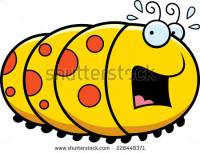Table of Contents
Group 4
Eat anything, keep always chewing: cannibalism in caterpillars induced by plant defenses
Wiki site of the practical exercise of the VII Southern-Summer School on Mathematical Biology.
Here you will find the exercise assignment and the group's products.
If you are a group member login to edit this page, create new pages from it, and upload files.
Introduction
Herbivory is known to cause several different responses in plants, from morphological to biochemical mechanisms, as defenses against herbivore attacks. The biochemical mechanisms against herbivores are usually complex and dynamic, and can be both direct and indirect. In a recent work (Orrock et al, 2017), the authors report experiments of induced defense mechanisms against herbivores in tomato plants (Solanum lycopersicum). They show that triggering plant defenses by the application of methyl jasmonate (MeJA) induces cannibalism in caterpillars of the species Spodoptera exigua.
 Induced cannibalism among herbivores may be beneficial to the plant in two ways: (i) herbivores eat less plant biomass (possibly by an alteration on palatability or leaf quality for the caterpillars), and (ii) cannibalism directly reduces herbivore abundances.
Induced cannibalism among herbivores may be beneficial to the plant in two ways: (i) herbivores eat less plant biomass (possibly by an alteration on palatability or leaf quality for the caterpillars), and (ii) cannibalism directly reduces herbivore abundances.
Assignment
Build a hypothetical field scenario for this plant-herbivore interaction, developing and analysing an appropriate mathematical model that takes effects (i) and/or (ii) above into account. What
Questions and challenges
- Are there different approaches to introduce (i) and (ii) into population dynamics?
- How the relative strength of these two effects may influence population balance?
Challenge
How would the infection by horizontally-transmitted pathogens on the caterpillar population be altered with the induction of cannibalism? What if the presence of the pathogen makes the caterpillar more prone to be eaten by its own kind? Can ou introduce these ingredients into your model in a simple way?
Reference
Induced defences in plants reduce herbivory by increasing cannibalism Orrock, J., Connolly, B. and Kitchen, A.. Nature ecology & evolution 1, no. 8 (2017): 1205. https://www.nature.com/articles/s41559-017-0231-6

